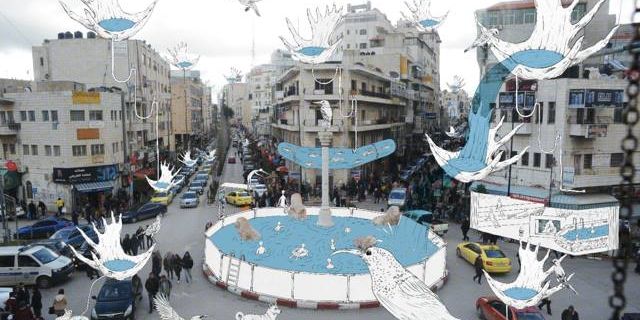افتتاح معرض: انقلابات محتملة Exhibition: Possible Reversals

-
التاريخ19 - Sep 2017
-
الساعة19:00 - 21:00
-
العنوانKhalil Sakakini Cultural Center مركز خليل السكاكيني الثقافي, المصيون, رام الله والبيرة
-
مشاهدة1336
يدعوكم مركز خليل السكاكيني الثقافي لحضور المعرض الفردي للفنانة البرازيلية ماريا تيريزا آلفز "انقلابات محتملة“ وذلك يوم الثلاثاء الموافق ١٩ أيلول/ سبتمبر الساعة السابعة مساءً
ويستمر المعرض حتى ١٦.١١.٢٠١٧
هذا المعرض بدعم من الصندوق العربي للثقافة والفنون (آفاق).
يضم المعرض حوالي ١٢ عملاً للفنانة بعضها يعود للثمانينيات، بينما أن معظم الأعمال جديدة تضم موضوع استخدام الفنانة للمبالغة والسخرية لتقديم مقترحات تكشف حقائق وعلاقات استعمارية في سياقات مختلفة، وإمكانية هذه المقترحات في بعض الأحيان لإحداث تغيير.
كما وزارت الفنانة فلسطين في شتاء ٢٠١٧ من أجل العمل على مشروع فنّي خاص بتكليف من مركز خليل السكاكيني الثقافي.
اهتمت آلفز خلاله بموضوع شُحّ المياه في المناطق الفلسطينية مقارنة بالمستوطنات الإسرائيلية المُقامة على الأراضي الفلسطينية المحتلة، ونفذت ثلاث لوحات على صور فوتوغرافية تحت عنوان
"إعادة حجز المياه" وهي بمثابة مقترح مبالغ به لإنفاق المياه الفائضة عندما تصبح متوفرة في نهاية المطاف.
يشمل المعرض أيضا أعمالاً حديثة من سياقات ومناطق أخرى تحاكي القضايا التي نواجهها في فلسطين، مثل العمل الفني "إمكانية عكس الفرص الضائعة" ٢٠١٦، حيث أنتجت آلفز ثلاث ملصقات عبر ورشات عمل مع مجموعة من السُّكان الأصليين عن إمكانيات تصوّر مستقبل في البرازيل خال من علاقة استعمارية واقتراح مؤتمرات مستقبلية بمشاركة السّكان الأصليين.
عمل آخر أقدم تقدمه آلفز في المعرض هو "رأس التجارة العادلة" ٢٠٠٧، حيث تستخدم السخرية للكشف عن العلاقة الاستعمارية المستمرة ما بين قبيلة الماوري (سكان أصليين في نيوزلندا) والحكومة الفرنسية عندما رفضت إعادة بقايا أجدادهم المحتجزة في متحف التاريخ الطبيعي في روان.
كما يشمل المعرض أعمالاً للفنانة من فترة الثمانينيات التي اتّسمت بأعمال ومُشاركات أكثرها سياسية، حيث كانت الفنانة من مؤسسي الحزب البرازيلي الأخضر وهي ناشطة في الدفاع عن حقوق السكان الأصليين في البرازيل.
عن الفنانة:
ولدت ماريا تيريزا آلفز في ساو باولو، البرازيل عام ١٩٦١ وهي من السكان الأصليين. تعمل كفنانة منذ الثمانينيات، وتنتج أعمالاً فنية تبحث في تواريخ وظروف وشعوب تم إسكاتها. تستند مشاريعها إلى البحوث وتتطور من تفاعلاتها مع البيئات المادية والإجتماعية للأماكن التي تعيش فيها، أو الأماكن التي تقيم فيها. تدرك الفنانة الثنائيات الغربية بين الطبيعة والثقافة والفن والسياسة أو الفن والحياة اليومية ولكنها ترفض عمداً التعامل معها ضمن ممارستها الفنية، وتختار بدلاً من ذلك خلق مساحات لإظهار ثقافات مضطهدة من خلال الممارسات العلائقية للتعاون التي تتطلب حركة مستمرة عبر الحدود.
عرضت أعمال الفنانة في معارض عدة منها ترينالي باريس، ترينالي غوانجو، دوكيومنتا ١٣ في كاسل، بينالي ساو باولو، بينالي تيبيي، مانفستا ٧ في تريتينو، بينالي براغ، بينالي أثينا، بينالي لينون حيث حصلت على جائزة الفرنكوفون. وحصلت مؤخرا آلفز على جائزة مركز الفيرا لست للفن والسياسة في جامعة النيو سكول في نيويورك.
Khalil Sakakini Cultural Centre is pleased to invite you to Possible Reversals: a solo exhibition by Maria Thereza Alves
19th September, 2017 at 7pm
The exhibition continues until 16/11/2017
This exhibition is supported by The Arab Fund for Arts and Culture (AFAC).
This exhibition by artist Maria Thereza Alves is a solo exhibition encompassing old and recent artworks. The artist visited Palestine in the winter of 2017 for initial research to make new work commissioned by KSCC. Alves was interested in water and its scarcity in the Palestinian areas compared to nearby Israeli settlements on occupied land. The work Recapturing Water is a humorous and exaggerated proposal for the expenditure of surplus water when it is eventually available. The exhibition also encompasses recent works from other contexts and regions, which find echo with issues faced here in Palestine; such as A Possible Reversal of Missed Opportunities, 2016, where three posters resulted out of workshops with indigenous peoples who had the possibility to imagine a decolonized Brazilian future by proposing future conferences with indigenous participation, another is Fair Trade Head, 2007 where another proposal of reversal reveals the absurdity of the lasting colonial hegemonic relationship between the French government and the Maori tribe by refusing to return ancestral remains kept hostage at the Museum of Natural History in Rouen to the Maori tribe.
Other older works included are from Maria Thereza’s work in the 1980s which was more politically centered. The exhibition is a take on the exaggerated and humorous proposals in Alves’ works, how they reveal colonial realities in different contexts, and their surprising potential to bring about change.
Alves (1961, Sao Paulo, Brazil) has worked and exhibited internationally since the 1980s, creating a body of work investigating the histories and circumstances of particular localities to give witness to silenced histories. Her projects are researched-based and develop out of her interactions with the physical and social environments of the places she lives, or visits for exhibitions and residencies. These projects begin in response to local needs and proceed through a process of dialogue that is often facilitated between material and environmental realities and social circumstances. While aware of Western binaries between nature and culture, art and politics, or art and daily life, she deliberately refuses to acknowledge them in her practice. She chooses instead to create spaces of agency and visibility for oppressed cultures through relational practices of collaboration that require constant movement across all of these boundaries.
Maria Thereza has exhibited among others in; the Paris Triennial, Guangzhou Triennial, (d)OCUMENTA 13 in Kassel, the Sao Paulo Biennial, the Taipei Biennial, Manifesta in Trento, the Prague Biennal, the Athens Biennal and the Lyon Biennal where she received the Prix de la Francophonie. She has recently won the Vera List Center Prize for Art and Politics